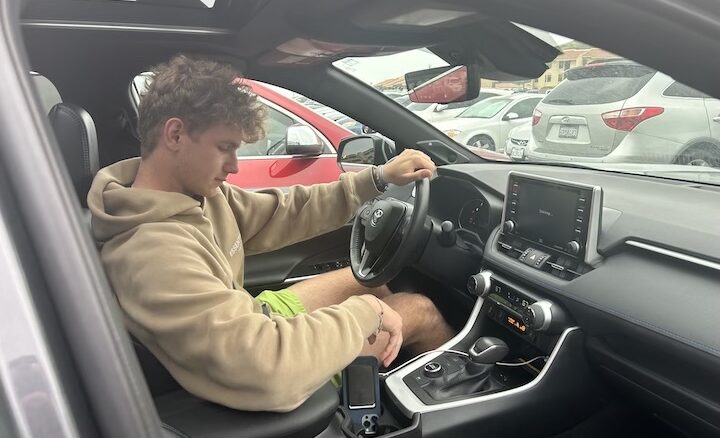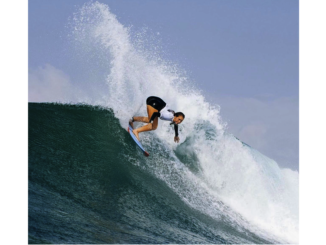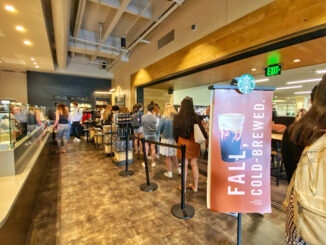
Pepperdine University is located in the picturesque Malibu mountains facing the Pacific Ocean. Students who live on campus are permitted to register and park a car on campus.
But with the isolated campus, students who do not have cars need to rely on the goodness of others.
“I usually get rides with the brothers in my fraternity,” said Calvin Peterson, first-year international business and sport administration major. “Because there is not a whole lot of public transportation around Malibu off campus and since I don’t have a car, that’s how I often get around.”
Due to the difficulty of public transportation in Malibu and the high price of Uber and Lyft, students without cars said they will often ask for rides two to three times a week to go off campus for food or other activities. This can impact their relationships with their friends, helping to create a stronger relationship or a transactional one.
Student-car ownership
Dawn Emrich, director of Public Safety, wrote in an email response that she wasn’t able to disclose information about how many students have registered a car on campus. There are approximately 860 student parking spots in the Rho and Firestone parking lots and 3,100 total spots on campus for commuter and non-commuter students to park, Emrich wrote.Approximately 3,200 undergraduate students live on the Malibu campus full time, according to the Pepperdine Office of Institutional Effectiveness Factbook.
Where students need — or want — to go
First-year advertising major Lexi Fok is one of the students who lives on campus and who does not have a car.
“I usually get rides to the Country Mart,” Fok said.
The Malibu Country Mart is a popular place for students to dine and shop, but it is located over a mile from Pepperdine’s campus (Malibu Country Mart) and is not easily accessible by foot.
The campus shuttle goes to the Country Mart three times a day at 1:25 p.m., 3:25 p.m. and 5:25 p.m., according to the Campus Shuttle website. This gives students access to numerous shops and restaurants. The shuttle also stops at nearby Whole Foods Market and Ralphs.
Zuma Beach (Zuma Beach) is another popular place that students travel to off campus. The campus shuttle doesn’t go to Zuma, and Zuma is a 15-minute drive away.
Students without cars can walk to the beach from the shopping shuttle drop-off locations, but these are not the most popular spots for students to go too.
Students go off campus to these spots for various reasons.
“For groceries and different food, and sometimes it’s nice to get off campus and see something new,” first-year business major Luke Taylor said.
Other students have similar reasons to go off campus.
“I often want to go off campus to go and get food at Chipotle or at other places in the Country Mart, ” Peterson said. “It’s nice to buy food from other places other than the cafeteria.”
The shuttle often conflicts with class schedules, students said, leaving them with few transportation options. Thus, rides from friends become even more vital.
“I constantly rely on friends for rides,” Fok said. “Sometimes, if I don’t know them very well and I have to call them then it’s like maybe it can be weird sometimes to ask for rides.”
Taylor said not having a car and then getting a car taught him a lot.
“I actually think it taught me a lot about being grateful for the car that I have now,” Taylor said. “I feel like if I was to give advice to anyone with a car it would be don’t get one first semester so that you can feel the feeling of being a typical college student and you have to rely on other people.”
Strengthens relationships
Students said they mostly rely on a few friends for rides. If the destinations are not inconvenient for the driver, time spent in the car together can strengthen the relationship between driver and passenger.
“It strengthens our relationship because it builds a bond,” Taylor said. “I can rely on people and they can rely on you. It brings you closer together, the more time you spend with someone the closer you will be with that person.”
Spending time with people is a great way to strengthen relationships with others. Taylor said the ability to talk, laugh and listen to music in the car creates a bond like no other, with the journey being more memorable than the destination at times.
That being said, asking for rides could potentially negate the positive effects on relationships if done poorly.
“Basic relational affinity goes a long way,” said Kelly Haer, executive director of the Boone Center for the Family.“If the person doing the asking does well at that in terms of being considerate, not being demanding, not taking it for granted, not being entitled. But if they say, ‘Hey, let me chip in for gas,’ they offer a thank you by adding fairness.”
Students who ask for rides said they commonly offer gas money or to buy lunch for someone as a thank you to show appreciation or to repay friends for longer distances.
“I always try to offer gas money,” Peterson said. “At the end of the day it is somewhat difficult to drive other people, especially if it’s out of the way.”
Negative impact on relationships
Students without a car said it can be difficult to continuously ask for rides from friends and potentially strain the relationship.
“I don’t want to impose my favors too often,” Peterson said. “So it can become a bit awkward if I am asking the same person over and over again.”
Haer said the fear of being too overbearing is very real in this situation, which can lead to a person not asking for a ride, resulting in a feeling of being stuck on campus and isolated.
Another struggle students without cars found was considering the time and place to ask for rides, as asking when a person has a class or late at night could end with poor results.
“It’s really a question of how it’s done,” Haer said. “Is it one of entitlement and demand or is it one of humility and graciousness? What kind of reciprocity is built into the relationship?”
When done improperly, asking for rides can lead to harmful consequences for the relationship, such as failing to receive a ride, annoying the driver, or the eventual decline of the friendship, Haer said.
An example of these events happened to 2022 alumnus Grant Lee. During his senior year at Pepperdine, Lee served as an resident advisor for first-year housing and received requests from his friends who also lived on campus to ride to organizational events. He often offered rides to his friends for said events, but at some point his friends started to abuse that courtesy.
“Our relationships became a little transactional,” Lee said. “I felt that they were just relying on me for a ride. They would just assume that I would give them a ride even if I wasn’t going.”
Haer said transactional relationships could deteriorate friendships and fracture other relationships. It can lead the person to feel used and not appreciated for what they are doing to help the other person.
Ross Bancken reported this enterprise story in Jour 241 during the Spring 2023 semester under the supervision of Dr. Christina Littlefield and Dr. Theresa de los Santos. Dr. Littlefield supervised the web article.




